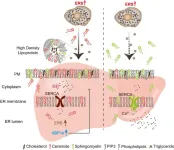(Press-News.org) PISCATAWAY, NJ – A prevention program that teaches college students about the links between risky drinking and sexual assault—and how to protect themselves and their friends—has shown early promise, according to a new report in the Journal of Studies on Alcohol and Drugs.
It’s well known that alcohol and sex can sometimes be a dangerous mix for young adults. Alcohol intoxication raises the odds of having unprotected sex and, possibly, contracting a sexually transmitted disease or having an unplanned pregnancy. Drinking can also increase the risk of falling victim to sexual assault or becoming the perpetrator.
Yet college prevention programs have traditionally addressed those closely connected issues separately, essentially “siloing” them, said Lucy Napper, Ph.D., one of the lead authors on the new study and an associate professor of psychology at Lehigh University, in Bethlehem, Penn.
So a team of researchers at Lehigh University and Brown University, led by Napper and Shannon Kenney, Ph.D., designed an all-in-one program aimed at reducing college students’ problem drinking and their risks of unsafe sex and sexual victimization. First, it addressed students’ misperceptions around their peers’ drinking and sexual behaviors (busting the myth that heavy drinking and casual unprotected sex were rampant on campus). Then it taught them practical skills they could use to protect themselves and their friends when they were out at parties or bars.
For example, Napper explained, students can have a plan for checking in with friends while they’re out, have a plan for getting home and decide that no one in their friend group will be left behind. The program also covered “bystander intervention” skills—how to step in when a friend may be drinking too much or in danger of being sexually victimized. That kind of intervention, Napper said, doesn’t have to be confrontational; there are also “subtle” ways to interrupt a potentially dangerous situation and change the dynamics.
For the study, the researchers randomly assigned 217 college students to either take part in the program, dubbed SPLASH (for Sex Positive Lifestyles: Addressing Alcohol and Sexual Health), or attend a nutrition-and-exercise program. Students in the SPLASH program met in small groups, for two 90-minute sessions. The sessions were led by “facilitators,” but much of the time was devoted to students discussing the issues and learning from each other, Napper said.
Overall, the researchers found, SPLASH was a hit: Upwards of 90% of participants said it was helpful and they would recommend it to a friend. And compared with their peers in the nutrition-and-exercise program, SPLASH participants also showed more realistic perceptions of on-campus drinking, sexual behavior and their fellow students’ openness to bystander intervention—differences that were still apparent six months later.
That’s important, Napper said, because whether we’re aware of it or not, our perceptions of what other people are doing, or approve of, can often influence our own behavior.
“So being able to shift those perceptions may also shift students’ behavior over time,” Napper said.
Larger studies are needed to confirm whether the SPLASH program can, in fact, create those changes. But the initial findings are promising, according to Napper. Ultimately, she said, the goal is to help create campus cultures where “we’re all supporting and looking out for one another.”
END
Program takes aim at drinking, unsafe sex, and sexual assault on college campuses
2025-04-02
ELSE PRESS RELEASES FROM THIS DATE:
Inability to pay for healthcare reaches record high in U.S.
2025-04-02
WASHINGTON, D.C. – April 2, 2025 – The inability to pay for healthcare in the U.S. has reached a new high, with more than one-third of Americans (35%), or an estimated 91 million people, reporting that they could not access quality healthcare if they needed it today, according to the latest West Health-Gallup Healthcare Affordability Index. The Index has been tracking healthcare affordability and access in the U.S. since 2021.
Rates were higher among Black and Hispanic Americans, with 46% and 52%, respectively, reporting ...
Science ‘storytelling’ urgently needed amid climate and biodiversity crisis
2025-04-02
Scientists should experiment with creative ways of communicating their work to inspire action to protect the natural world, researchers say.
Scientists primarily publish their work in academic journals, where writing is expected to be technical, objective and dispassionate – making it unlikely to appeal to, or be easily understood by non-experts.
The researchers – from the University of Exeter – argue for science “translated into stories”, with benefits both for science and wider society.
They suggest ways that scientists can tell powerful, passionate stories without compromising the objectivity of science.
“As ...
KAIST Develops Retinal Therapy to Restore Lost Vision
2025-04-02
Vision is one of the most crucial human senses, yet over 300 million people worldwide are at risk of vision loss due to various retinal diseases. While recent advancements in retinal disease treatments have successfully slowed disease progression, no effective therapy has been developed to restore already lost vision—until now. KAIST researchers have successfully developed a novel drug to restore vision.
< Photo 1. (From left) Ph.D. candidate Museong Kim, Professor ...
Adipocyte-hepatocyte signaling mechanism uncovered in endoplasmic reticulum stress response
2025-04-02
The endoplasmic reticulum (ER) is the portion of the cell responsible for manufacturing and folding proteins. Proteins are essential for a wide range of cellular functions—as enzymes, transporters, hormones, antibodies, receptors, and more. They must be folded into the correct three-dimensional shape to function properly. If the ER is unable to manufacture or fold proteins correctly, the cell develops ER stress, which activates the unfolded protein response (UPR)—a protective mechanism aimed at restoring cellular function.
While UPR begins ...
Mammals were adapting from life in the trees to living on the ground before dinosaur-killing asteroid
2025-04-02
More mammals were living on the ground several million years before the mass extinction event that wiped out the dinosaurs, new research led by the University of Bristol has revealed.
The study, published today in the journal Palaeontology, provides fresh evidence that many mammals were already shifting toward a more ground-based lifestyle leading up to the asteroid’s impact.
By analysing small-fossilised bone fragments, specifically end of limb bones, from marsupial and placental mammals found in Western North America - the only place with a well-preserved terrestrial fossil record from this time – the team discovered signs that ...
Low LDL cholesterol levels linked to reduced risk of dementia
2025-04-01
People with low levels of low-density lipoprotein cholesterol (LDL-C) in their blood have a lower risk of dementia, including lower risk of Alzheimer’s disease related dementia, shows a study published online today in the Journal of Neurology Neurosurgery & Psychiatry.
Use of statins conveyed an additional protective effect for people with low LDL-C, specifically those with blood levels less than 1.8 mmol/L (<70 mg/dL), reducing their risk of dementia even further.
However, reducing LDL-C ...
Thickening of the eye’s retina associated with greater risk and severity of postoperative delirium in older patients
2025-04-01
Thickening of the macular layer of the eye’s retina is associated with a greater risk of postoperative delirium for older patients undergoing surgery under general anaesthetic, reveals a study published online in the open access journal General Psychiatry.
Postoperative delirium is one of the most common complications for older patients after surgery and can have profound implications for long-term health and wellbeing.
Patients with postoperative delirium require longer hospital stays and are more likely to require support at home to help with daily tasks such as washing, dressing, and eating or be discharged ...
Almost one in ten people surveyed report having been harmed by the NHS in the last three years
2025-04-01
Almost one in ten people in Great Britain experienced healthcare-related harm due to care or treatment they received from the National Health Service (NHS) or difficulties accessing care in the last three years, show the findings of a large population survey published in the journal BMJ Quality & Safety.
In more than eight out of ten cases, the harm had a moderate or severe impact on the respondent. Disadvantaged groups, including people with disabilities, long term conditions and those in lower socioeconomic groups, were ...
Enhancing light control with complex frequency excitations
2025-04-01
NEW YORK, April 1, 2025 — Researchers at the Advanced Science Research Center at the CUNY Graduate Center (CUNY ASRC) and at Florida International University report in the journal Science their insights on the emerging field of complex frequencies excitations, a recently introduced scheme to control light, sound and other wave phenomena beyond conventional limits. Based on this approach, they outline opportunities that advance fundamental understanding of wave-matter interactions and usher wave-based technologies into a new era.
In conventional light wave- and sound wave- based systems such as wireless cell phone technologies, microscopes, speakers ...
New research finds novel drug target for acute myeloid leukemia, bringing hope for cancer patients
2025-04-01
A team of scientists from The University of Texas Health Science Center at San Antonio (UT Health San Antonio) has identified a promising new drug target for acute myeloid leukemia (AML), a deadly blood cancer with a five-year survival rate of just 30%, according to the National Cancer Institute. Their study, published in Cell Stem Cell in February, highlights the crucial role of a protein called paraspeckle component 1 (PSPC1) in the progression of AML.
An aggressive blood cancer, AML originates ...






